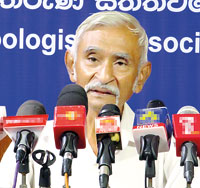News
Plastic pollution: YZA hits out at lip service by authorities and green washing by corporates
View(s):By Kumudini Hettiarachchi and Dilushi Wijesinghe
Four critical areas where Sri Lanka could have made major inroads to doing away with plastic were highlighted by Environmental Lawyer Jagath Gunawardena who is the Senior Advisor to the YZA.

Lawyer Jagath Gunawardena
There has only been talk but no action on the part of the officials and also some corporates, alleged Mr. Gunawardena, charging that in some instances there has been “blatant dishonesty” and also attempts at “green-washing” (making an unsubstantiated claim to deceive consumers into believing that a company’s products are environmentally friendly).
He takes up as the first issue the need to ban microplastic, pointing out that activists requested this action on March 9, 2019.
Without causing a loss for those importing microplastic and selling products with microplastic, the activists suggested the ban from January 2020, so that these importers and sellers could dispose of whatever they had in the interim.
“Absolutely nothing has been done by the authorities. This week, officials are paying lip service to the theme of World Environment Day which is ‘reducing plastic use’, but since 2019, they have not done anything with regard to banning microplastic beads which have no useful impact on humanity. In fact, they contaminate the environment and are harmful to humans and animals,” said Mr. Gunawardena.
The second major issue he raised was with regard to PET bottles made of polyethylene terephthalate.
Ranging from mega to buddy bottles, they come in different shapes, sizes and colours, he said, cautioning that in addition to the plastic used, there were also certain additives and dyes which are harmful to the environment and human health. The dyes in particular contain toxic substances including heavy metals.

Prof. Terney Pradeep Kumara
“We don’t see any dialogue on the part of the authorities or politicians with regard to reducing the use of PET bottles. It is only academics and activists who are shouting from the rooftops about the harm caused by PET bottles but no one is giving ear to them. PET bottles are also a huge problem when considering solid waste disposal,” said Mr. Gunawardena.
He lamented that there is no talk or idea on regulating the use of PET bottles, let alone going the whole way and banning them.
Small single-use plastic containers such as yoghurt, ice cream and wattalappan cups which are being used widely are also ignored by the authorities, who are looking with myopic vision only at the manufacture and use of plastic cups, plates, spoons, forks and string-hopper thattu which are being used small-scale, was another issue brought forth by Mr. Gunawardena.
He urged the authorities to look around and see the pollution caused by these small yoghurt, ice cream and wattalappan cups which also when discarded lead to the spread of mosquito-borne diseases such as dengue.
His final cry was against single-use plastic wrappings, the issue of which is not being addressed at all or being “dishonestly” addressed by the authorities and the corporates. 
Giving the background, Mr. Gunawardena said that in 2008, under the pretext of a “greening initiative”, supermarkets began charging money when they supplied plastic bags to consumers, claiming that such a charge would curb the use of plastic. Then a consumer petitioned the Supreme Court (SC) against such a charge for a bag and the SC ruled that supermarkets had to provide a bag free of charge to a consumer for his/her purchases.
“Nowhere did the petitioner mention or the SC specify that a plastic bag should be provided to carry purchases. The order of the SC was clear – that a bag should be provided. Without looking for a responsible alternative to plastic bags, the supermarkets continue to use plastic under the pretext that it was ruled by the SC. This is a fraudulent claim on the part of the supermarkets,” he said.
Pointing out that eight million tons of plastic are added to the sea from around the world, Ruhuna University’s Professor in Oceanography, Prof. Terney Pradeep Kumara said that 30% floats on the surface and 70% sinks to the bottom. Such a mantle of plastic prevents sunlight from getting through to the depths of the ocean hindering chlorophyll and plankton productivity. It also prevents oxygen and carbon dioxide reaching marine organisms, making breathing difficult. Moreover, bacteria and algae grow on microplastics and fish consume them which could lead to their death.
He added that in Sri Lanka, of all the plastic found in the seas around the country, 10% is from the fisheries industry and the balance 90% from what is discarded within the country.
| Survey findings Here is a survey conducted by YZA member Lahiru Dalugoda with regard to the plastic issue. It had been conducted on online media platforms, mainly WhatsApp and Facebook, from September 19-26, 2021. A majority of the participants had a tertiary education – a Degree, Master’s or PhD. The survey findings were: A majority of the participants had heard about single-use plastics (out of 195 responses) and microplastics (out of 204 responses), with the key source of information being social media. However, nearly half of them (47.1% of 204 responses) were unaware of ongoing social movements/campaigns/awareness programmes in their localities to reduce single-use plastics. To the question: Do you have any idea that Sri Lanka has banned some single-use plastic items? – 44.2% of 206 responses said “yes”; 42.2% said “yes, but not sure of the names of the items”; and 13.6% said “no”.
| |

The best way to say that you found the home of your dreams is by finding it on Hitad.lk. We have listings for apartments for sale or rent in Sri Lanka, no matter what locale you're looking for! Whether you live in Colombo, Galle, Kandy, Matara, Jaffna and more - we've got them all!

